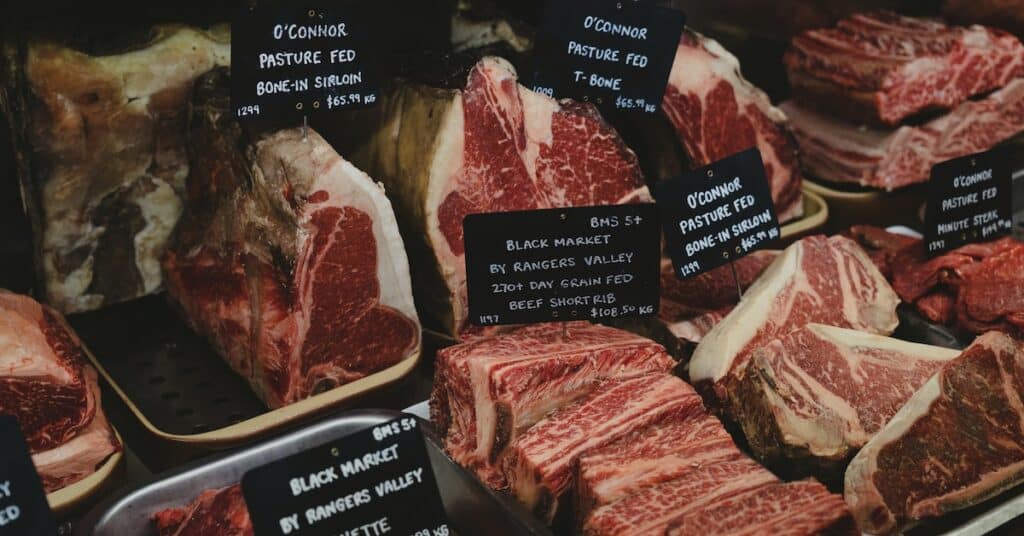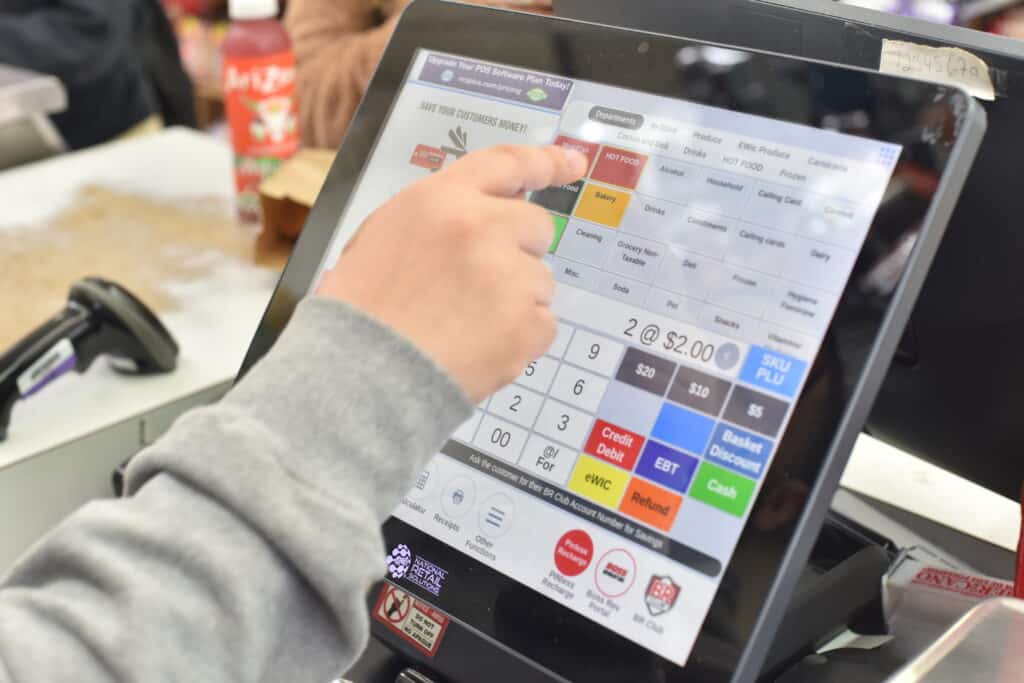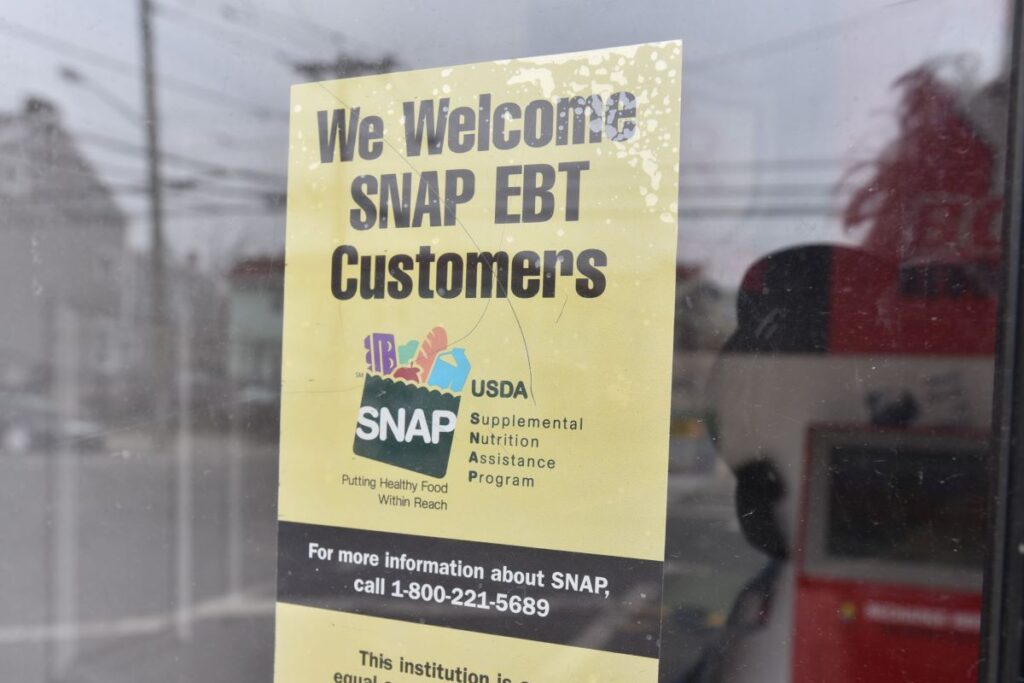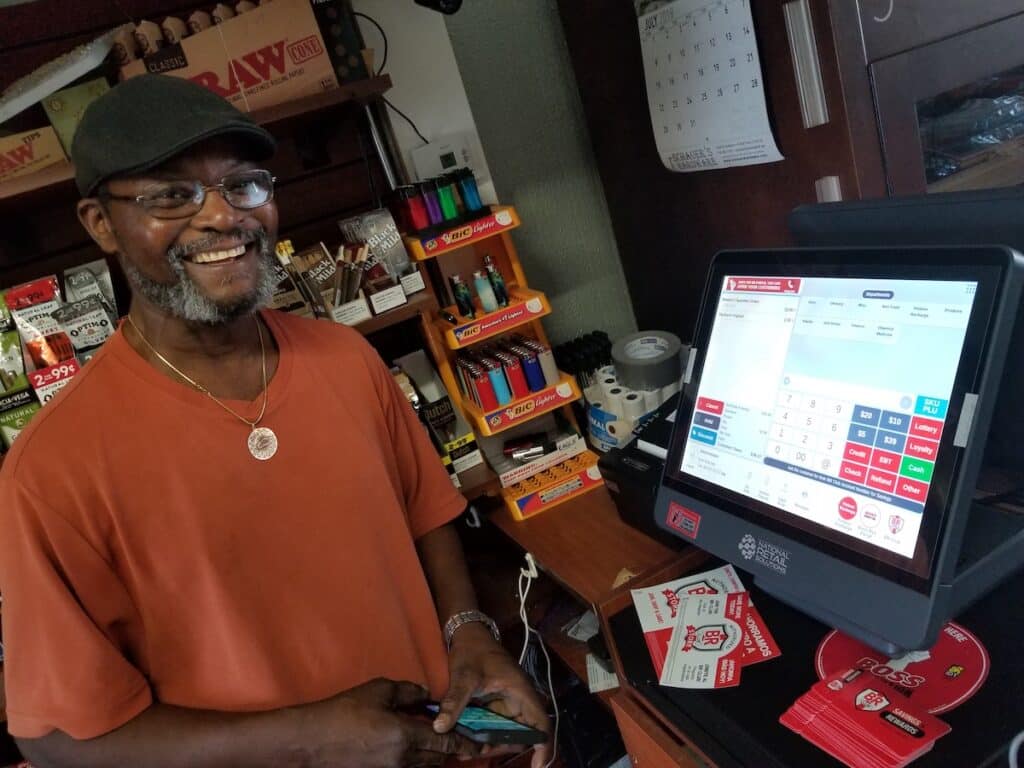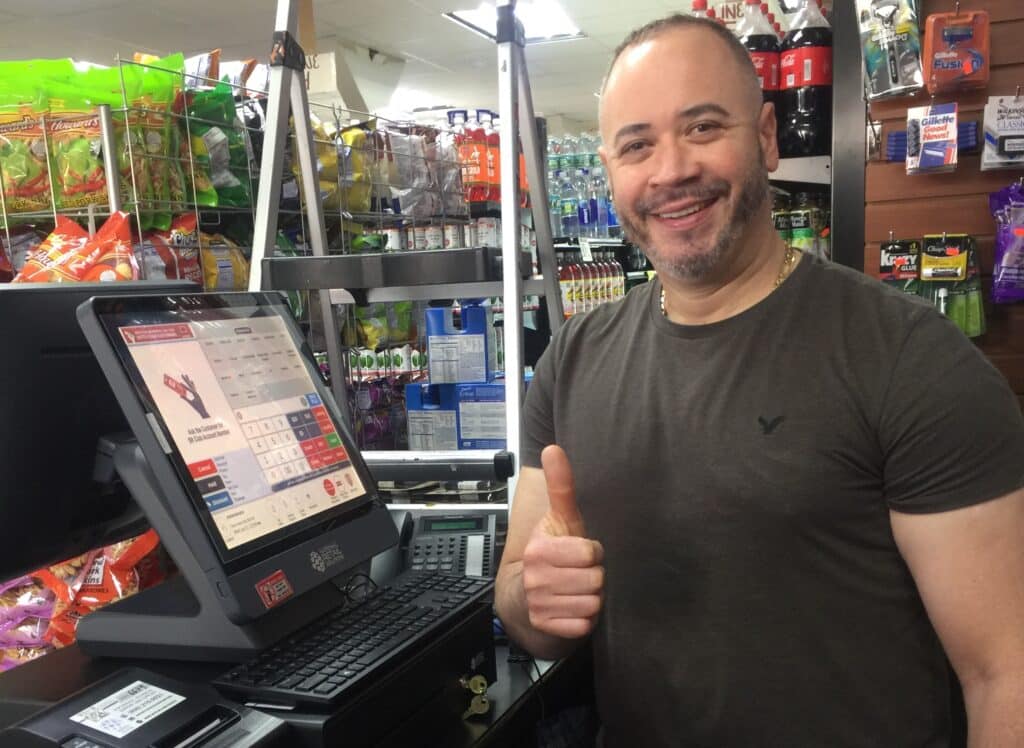How to Open a Profitable Butcher Shop in Your Neighborhood
- The resurgence of local food and artisanal products makes now the perfect time to start a butcher shop.
- Customers crave quality cuts and expert advice they can’t find at the grocery store.
- Follow this guide to turn your passion for quality meat into a thriving meat shop business.
What is a Butcher Shop?
- Specializes in Meat: A store that primarily sells meat and poultry. Some butchers may also have a limited selection of fish.
- Expert Preparation: Butchers are experts in cutting and preparing different types of meat. This means they can offer a broader range of cuts than a standard supermarket.
- Focus on Quality: Butcher shops often strongly emphasize the quality of their products, potentially sourcing from local farms or specializing in specific breeds.
What makes a butcher shop different from a supermarket meat section?

- Knowledge and Advice: Butchers are a wealth of information. They can offer recipes, cooking tips, and recommendations based on what you want to make.
- Custom Cuts: If you need a specific cut not on display, a butcher can likely prepare it. Need a boneless roast or a specific thickness of steak? They can take care of it.
- Beyond Standard Cuts: They often offer less common cuts, organ meats, in-house sausages, and other prepared products like charcuterie.
| Feature | Butcher Shop | Meat Store |
| Focus | Craftsmanship in cutting and preparation | Convenience with pre-cut and packaged meats |
| Quality & Source | High priority on freshness and quality, often sources locally | It may not emphasize sourcing, focus on a broad selection |
| Customization | Offers cuts to customer specifications | Generally offers standard, pre-cut options |
| Expertise & Advice | Guides steak selection and cooking | Less focus on specialized advice |
| Product Variety | Specialty items like house-made sausages, unique cuts | Wider variety of general types (poultry, pork, etc.) |
| Pricing | It may be higher due to quality and sourcing | Competitive pricing is often lower due to volume sales |
| Associated Environment | Standalone shops with a focus on meat | Typically part of supermarkets |
Additional things you might find at a butcher shop:
- Deli: Some shops function as delis, offering sandwiches and prepared foods using their products.
- Grocery Items: Many stores carry complementary grocery items, such as sauces, spices, and other products that pair well with meat.
How to Start a Butcher Shop
Here’s a comprehensive guide on how to start a butcher shop. It’s a complex process, but if you’re passionate about excellent meat, it can be a rewarding business:
Fundamental Steps
- Develop Your Expertise: If you don’t already have it, gain experience as a butcher. Consider apprenticeships, courses, or working at an established shop. Knowledge of cuts, preparation, and handling is crucial.
- Market Research: Analyze your local market. Are there existing butcher shops? What’s the demand like? What will make your shop stand out (e.g., focus on organic meats, specialty cuts, prepared foods)?
- Business Plan: It outlines your concept, target market, financial projections, costs, marketing strategy, and operations. Seek professional help if needed.
- Funding: Secure financing for your venture. This could be through loans, investors, grants, or personal savings.
- Location: Find a visible spot with good foot traffic, ideally near other food-related businesses. Consider the size needed for your operations and customer space.
- Licenses and Permits: Regulations vary by location. Obtain all necessary legal licenses, including business licenses, food handling permits, and health inspections.
- Equipment: Invest in:
- Grinders, saws, knives, and cutting tools
- Display cases and refrigerators
- Scale and cash register
- Packaging materials
- Suppliers: Establish relationships with reliable, high-quality suppliers. Consider local farms and wholesalers.
- Staffing: Hire skilled butchers if you need to do it. You may need cashiers and general help.
- Marketing: Spread the word before opening! Utilize social media, local advertising, and partnerships with other food businesses.
Tips for Success
- Quality First: Your reputation rests on top-notch products. Don’t compromise.
- Customer Service: Build customer relationships, offer advice, and remember their preferences.
- Specialty Items: Consider sausages, cured meats, or prepared dishes to stand out.
- Cleanliness: Adhere to strict hygiene standards. Your shop and processes should be impeccable.
- Stay Updated: Follow industry trends, new cuts, and evolving customer preferences.
Define Your Market and Find a Location
A proper marketing and sales strategy puts your target audience at the center of focus.
Before you make any sales strategy decisions, consider the people who will buy your products. You might appeal to customers interested in gourmet cooking if you sell specialty meats.
You may also sell various popular products that the average family will buy.
- Define Your Market:
- Focus on a proper marketing and sales strategy.
- Center your strategy around your target audience.
- Understand the preferences of your potential customers.
- Specialty Meats:
- Appeal to customers interested in gourmet cooking.
- Offer a variety for the average family.
- Location for Your Meat Shop or Butcher Shop:
- Ensure your shop has a noticeable location in the neighborhood.
- Consider the affordability and visibility of spaces on busy roads.
- Aim for locations that community members pass daily.
- Ensure commuters see your shop as a convenient place for dinner supplies.
Your shop must have a noticeable location to become an important part of your neighborhood. Find out if you can afford a space on a busy road that community members pass daily.
People who commute to work will see your shop often and know it as a convenient place to get dinner supplies on the way home.
Butcher Shop Business Plan: Key Sections
Starting a butcher shop requires a solid foundation for success. A comprehensive business plan is your blueprint. Here are crucial sections to include:
- Executive Summary: Summarize your concept, what makes your shop unique, your target market, your financial projections, and your funding needs. This is your elevator pitch for the entire plan.
- Company Description: Detail your ownership structure (sole proprietorship, LLC, etc.), the mission of your shop, and your competitive edge (e.g., focus on locally sourced products, house-made charcuterie).
- Market Analysis: Research existing butcher shops, supermarkets, and potential customer trends. Analyze demand, competition, and how you’ll meet needs in your area.
- Products and Services: Describe the specific cuts, additional offerings (e.g., sausages, prepared foods), and any potential complementary items you’ll sell.
- Marketing and Sales: Outline your plan to reach customers. Will you rely on online platforms, local community partnerships, or a mix? How will you drive initial and regular sales?
- Financial Projections: Include forecasts for revenue, expenses (rent, inventory, staffing, utilities), and profitability. Detail your startup cost needs and planned funding sources.
- Management and Operations: Describe how you’ll manage the shop. Do you have the expertise? Will you hire skilled staff? Outline your plan for the day-to-day operations.
Important Tip: Business plans aren’t set in stone! Revisit and adjust yours regularly, especially in your first year, as you gather data and experience.
Get the Right Butcher Shop Equipment
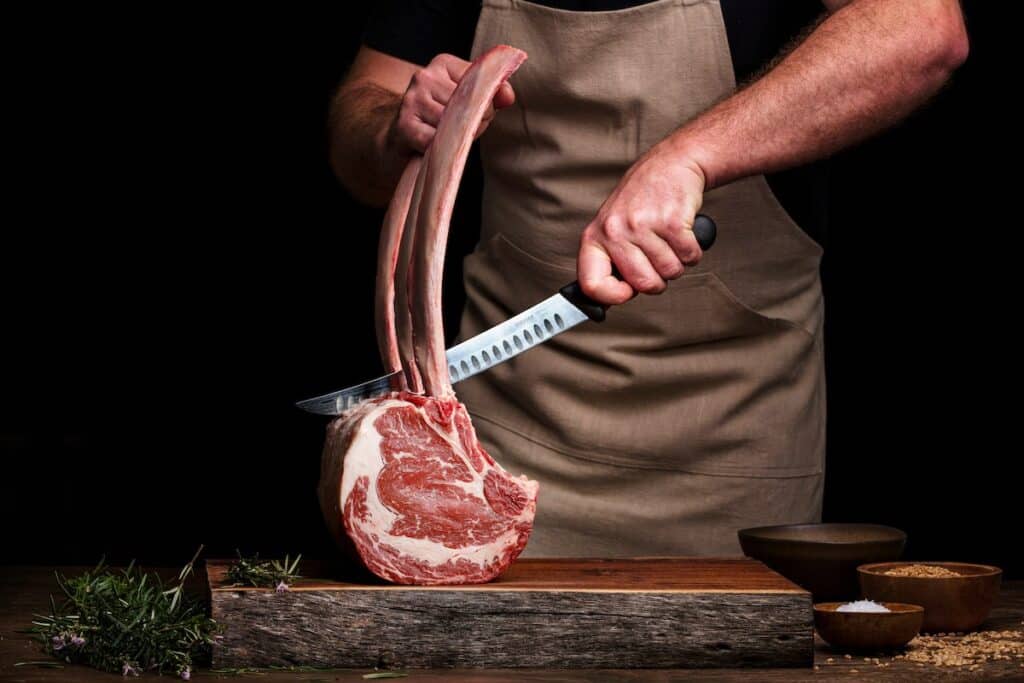
The right equipment for your shop depends on several factors, including the type of cuts you plan to offer, the size and volume of your business, and your budget.
Here’s a breakdown of essential and optional equipment to consider:
- Refrigeration:
- Walk-in Coolers and Freezers: To store large quantities of meat at safe temperatures.
- Display Cases: To attractively showcase your cuts for customer selection.
- Cutting and Processing:
- Band Saw: To cut through bone and large joints.
- Meat Grinder: For grinding burgers, sausages, and other uses.
- Knives: High-quality knives in various sizes for cutting tasks (boning, trimming, breaking down large cuts).
- Cleaver: A heavy cleaver for chopping through bone and dense parts.
- Worktables: Stainless steel tables for prepping and processing meat. Ideally, with built-in sinks for hygiene.
- Sales:
- Scales: An accurate scale for weighing items before packaging and selling.
- Packaging Materials: Packing paper, twine, vacuum sealer (optional).
- POS System: For processing sales and tracking inventory.
Optional Equipment:
- Slicer: For precise and consistent slicing of deli meats, roasts, etc.
- Hamburger Patty Maker: Increases speed and uniformity for forming hamburger patties.
- Sausage Stuffer: If you plan on making your own sausages.
- Mixer: Useful for large batches of ground meat or sausage production.
- Smokehouse: Smoking your own meats (might require additional permitting and expertise).
Additional Considerations:
- Used Equipment: Well-maintained used equipment can be a cost-effective option, especially for starting a shop.
- Sanitizing Equipment: Ensure you have proper sanitation tools and supplies to maintain a hygienic workspace.
- Protective Gear: Knives are sharp! Invest in protective gear like cut-resistant gloves and aprons.
Tailor your equipment selection to your specific needs and budget.
Choosing the Right POS System for Your Butcher Shop
A modern POS system goes far beyond just ringing up sales.
It’s the nerve center of your shop, streamlining operations and enhancing customer experience.
Here’s why it’s crucial:
- Inventory Management: A food-specific POS system lets you track cuts, weights, and pricing, simplifying re-ordering and minimizing waste from overstocking.
- Efficient Sales: Quickly and accurately process sales for individual cuts using a weight-based system. Many POS systems integrate with scales, further streamlining the checkout process.
- Customer Insights: Track customer purchase history, preferences, and buying patterns to tailor promotions and recommendations.
- Loyalty Programs: Reward repeat customers and incentivize additional purchases through loyalty programs or discounts that are easy to manage through your POS.
- Recipe Integration: Some POS systems offer built-in recipe features, allowing your workers to quickly provide cooking tips and meal ideas using specific cuts, boosting customer value.
- Reporting and Analytics: Generate detailed sales reports, track popular items, identify trends, and make informed decisions about inventory, pricing, and marketing.
Look for a point of sale system designed for specialty food retailers. These systems understand the importance of weight-based pricing, recipe integration, and robust inventory management specific to your product types.
Investing in a well-suited POS system will increase efficiency, profitability, and customer satisfaction—a winning combination for your shop!
FAQ:
Q: Is the butchery business profitable?
A butchery business can be profitable with careful planning, skilled butchers, a good location, high-quality products, and innovative marketing. It’s definitely not a get-rich-quick scheme, but it can offer a stable income if managed well.
Q: What are the profit margins of a butcher shop?
- Gross margins: Butcher shops can have around 40-45%. This means that for every dollar of sales, about 40-45 cents cover the cost of the meat itself.
- Net margins: After expenses like rent, labor, utilities, etc., net profit margins typically range from 5% to 25%.
Q: How much does opening a meat or a butcher shop cost?
The cost to open a butcher shop can vary depending on size and location, but here’s a general idea:
- Small shop: $50,000 – $100,000
- Medium-sized shop: $100,000 – $200,000+
Don’t settle for a generic POS system!
National Retail Solutions (NRS) offers features specific to butcher shops, such as weight-based pricing, recipe integration, and advanced inventory management.
Get a free quote and see how NRS can take your butcher shop to the next level.
